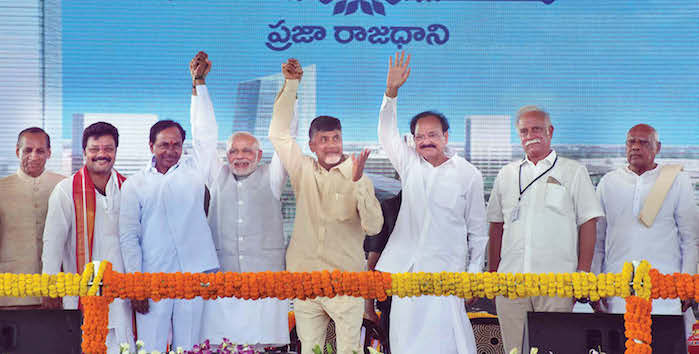
FORTALEZA, BRAZIL (TIP): BRICS should be driven by people-to-people contact led by the youth of the five nations, India‘s Prime Minister Narendra Modi has told leaders of China, Russia, Brazil and South Africa at the summit in Brazil. “Our own greater good, however, lies more in deepening our bonds vertically.
This is why I have spoken on decentralizing this powerful forum in our earlier deliberations. We must proactively move beyond being Summit-centric. We must champion Sub-national Level exchanges. Champion engagement between our States, Cities and other local bodies. BRICS should in fact, be driven by ‘People to People’ contact. Our Youth in particular must take a lead in this,” Modi said in a statement at the Plenary Session of the 6th BRICS Summit in Fortaleza on July 15.
For this people-to-people contact, he sought a BRICS Young Scientists’ Forum, BRICS language schools, Massive Open Online Courses and a BRICS University. Modi also said that “BRICS must provide a united and clear voice in shaping a peaceful, balanced and stable world”. “We should intensify our cooperation in confronting global challenges; like Terrorism, Cyber Security and Climate Change. BRICS must also play a proactive role in shaping the global discourse on Growth and Development. This includes shaping the post-2015 Development Agenda to keep the central focus on tackling poverty,” he said.
He also sought reforms in UN Security Council and shape the World Trade Organisation. “We must seek urgent reforms of global institutions of governance like the UN Security Council and international financial institutions. We must help shape the WTO regime. An open trading regime is critical for strong, balanced and sustainable global economic growth. This must address the development aspirations of the developing world. It must also accommodate the special needs of the weak especially in areas such as Food Security,” he said.
ABOUT BRICS
BRICS is the acronym for an association of five major emerging national economies: Brazil, Russia, India, China, and South Africa. The grouping was originally known as “BRIC” before the inclusion of South Africa in 2010. The BRICS members are all developing or newly industrialised countries, but they are distinguished by their large, fast-growing economies and significant influence on regional and global affairs; all five are G-20 members.
As of 2013, the five BRICS countries represent almost 3 billion people with a combined nominal GDP of US$16.039 trillion and an estimated US$4 trillion in combined foreign reserves. As of 2014, the BRICS nations represented 18 percent of the world economy. South Africa held the chair of the BRICS group in 2013, having hosted the group’s fifth summit in 2013.
The BRICS have received both praise and criticism from numerous quarters. Argentina participated in the Fortaleza Summit held in July 2014 in response to an invitation by Russia. In that meeting, the BRICS countries will discuss the possible admission of Argentina as the sixth member country. The term, “BRICS”, was coined by economist Jim O’Neill in his publication, Building Better Global Economic BRICs.
History
The foreign ministers of the initial four BRIC states (Brazil, Russia, India, and China) met in New York City in September 2006, beginning a series of high-level meetings. A full-scale diplomatic meeting was held in Yekaterinburg, Russia, on 16 May 2008.
First summit
The BRIC grouping’s first formal summit, also held in Yekaterinburg, commenced on 16 June 2009,[13] with Luiz Inácio Lula da Silva, Dmitry Medvedev, Manmohan Singh, and Hu Jintao, the respective leaders of Brazil, Russia, India and China, all attending. The summit’s focus was on means of improving the global economic situation and reforming financial institutions, and discussed how the four countries could better co-operate in the future. There was further discussion of ways that developing countries, such as the BRIC members, could become more involved in global affairs.
In the aftermath of the Yekaterinburg summit, the BRIC nations announced the need for a new global reserve currency, which would have to be “diversified, stable and predictable”.[15] Although the statement that was released did not directly criticise the perceived “dominance” of the US dollar – something that Russia had criticised in the past – it did spark a fall in the value of the dollar against other major currencies.





Be the first to comment